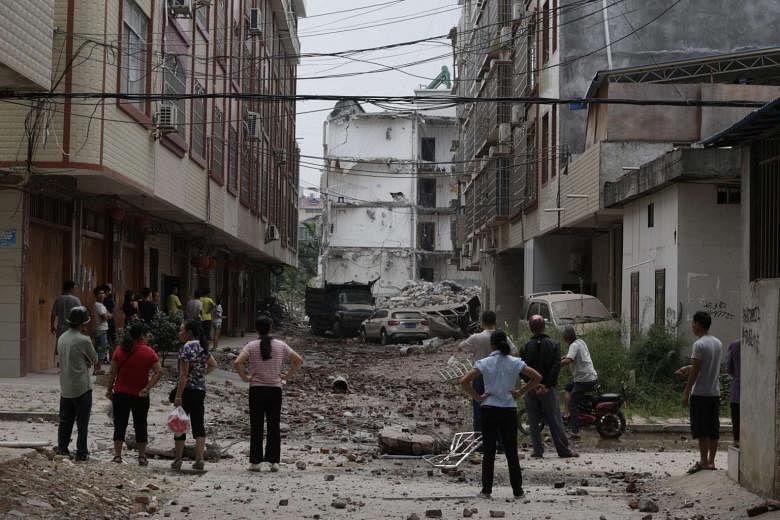BEIJING (Reuters) - A series of deadly bomb blasts in China this week has shown how easy it is to acquire explosives in the country, revealing a major gap in its huge security apparatus as the economy slows and anger grows over issues like graft and poor public services.
In a country where firearms are banned for most people, the bombings in the southwestern city of Liuzhou on Wednesday (Sept 30), and others in recent years around the country, demonstrate lax enforcement of rules to control access to bomb-making material.
Private gun ownership is almost unheard of in China as controls are so strict, meaning gun crime is rare. Explosives, on the other hand, are widely available from the sprawling mining and fireworks industries.
The 17 coordinated blasts across Liuzhou, a relatively obscure part of China, destroyed one whole side of a low-rise residential building, overturned vehicles and sent bricks showering into the street, images carried by state media showed. At least seven people died and more than 50 were injured.
The attack has been blamed on one individual in the city, but such "sudden incidents", as China refers to them, highlight broader government worries about stability in the world's second-largest economy, with a widening gap between rich and poor and growing anger at corruption and environmental issues.
"Modern Chinese society has lots of contradictions, and if people want to send a message about their anger or make a point, they can get explosives from any mine," said Mr Pan Zhiping, a domestic security expert at the Xinjiang Academy of Social Sciences. "It simply isn't possible for the police to keep an eye on everybody."
The ease at which explosives can be obtained in the world's second-largest economy was underscored in a court case posted online earlier this year as part of a government transparency drive.
In September last year, a court in south-western China's Yunnan province jailed a man for three years after finding more than 20kg of explosives, almost 100 detonators and 1.5km of fuses at his house.
The man, whose surname was given as Ren, told the court he had been easy to buy the material by saying it was for work needs, according to the judgment.
In fact, Mr Ren said he had been buying the explosives and storing them at home for the last decade without any problems, though he seemed to have no violent intent.
The police confirmed the suspect in the blasts in China's southwestern city of Liuzhou was Wei Yinyong, 33, who was believed to have been involved in a dispute with his neighbours, Xinhua said.
"It indicates a serious problem in China in terms of public security. It reflects a lack of effective control by the government to restrict access to these dangerous goods," said Dr Jian Zhang, a lecturer in international and political studies at UNSW Australia in Canberra.
On Thursday (Oct 2) morning, another blast was reported in Liuzhou, although it only caused minor damage and no casualties. It was not clear if it was linked to the previous day's blasts.
Guangxi is home to many mines, which use explosives, and like the rest of China it will have lots of firework manufacturers.
Last year, police in Liuzhou arrested a father and son who were "unhappy with society and wanted revenge" and blew up trash cans in a public square using home-made firecrackers, injuring a female bystander, according to state media.
However, explosives are not often seen in violence in the far western region of Xinjiang, where China says it is battling an Islamist insurgency, with tight security limiting access to bomb-making materials or guns. Knives are generally involved in the violence there.
State media microblogs have already begun speculating on the motive for the latest attack in Liuzhou, with some suggesting it was the result of a dispute over medical treatment, a cause of several violent incidents in recent years.
While the Chinese government has ramped up health spending, hospitals are frequently overwhelmed with patients. Doctors are also badly paid, leading to corruption and suspicions that staff are more interested in making money by prescribing unnecessary drugs and treatment than tending to the sick.
Property disputes in a country where the government legally owns all land have also led to unruly protests, fights with police, imprisonment and even suicide, and created a major headache for the stability-obsessed ruling Communist Party.
In 2011, a man apparently angry about the illegal demolition of his home set off coordinated explosions at three sites near government buildings in eastern China, killing two.
In the same month, a petrol bomb set off by a disgruntled former employee at a rural bank in a heavily Tibetan region of northwestern China's Gansu province wounded 49 people.
The worst incident of its kind happened in 2001, when a string of explosions at workers' dormitories in the northern city of Shijiazhuang killed 108 people, blamed on a man seeking vengeance for family problems, although many doubt that explanation.

